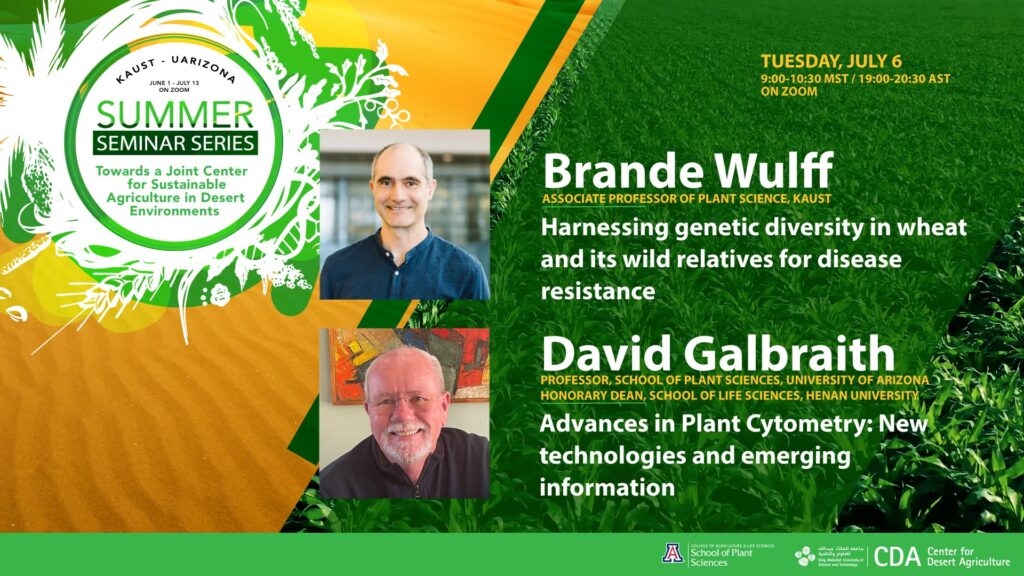
KAUST-University of Arizona Summer Seminar Series: Towards a Joint Center for Sustainable Agriculture in Desert Environments
Tuesday, July 6, 2021
7:00 – 8:30 p.m. (AST)
On Zoom
Password: 905015
Harnessing genetic diversity in wheat and its wild relatives for disease resistance
By Brande Wulff
Associate Professor of Plant Science, KAUST
Abstract
Genetic diversity for disease resistance has been eroded in bread wheat through polyploidisation, domestication, and breeding. We have developed sequence-configured panels of wheat and wild progenitors for high-throughput identification of disease resistance genes by association mapping or mutational genomics [1-4]. Cloned resistance genes can speed up resistance breeding through generation of GM stacks [5] or by conventional marker-assisted selection in combination with speed breeding [6,7]. We propose an internationally coordinated effort to generate a wheat resistance gene atlas to facilitate more judicious deployment of resistance genes in GM and conventional breeding programmes [8].
1. Steuernagel et al (2016). Rapid cloning of disease-resistance genes in plants using mutagenesis and sequence capture. Nature Biotechnology 34:652-5.
2. Sánchez-Martín et al (2016). Rapid gene isolation in barley and wheat by mutant chromosome sequencing. Genome Biology17(1):221.
3. Arora et al (2019) Resistance gene cloning from a wild crop relative by sequence capture and association genetics. Nature Biotechnology 37:139-143.
4. Gaurav et al. (2020) Evolution of the bread wheat D-subgenome and enriching it with diversity from Aegilops tauschii. bioRxiv doi.org/10.1101/2021.01.31.428788
5. Luo et al. (2021). A five-transgene cassette confers broad-spectrum resistance to a fungal rust pathogen in wheat. Nature Biotechnology. doi.org/10.1038/s41587-020-00770-x
6. Watson et al (2018). Speed breeding is a powerful tool to accelerate crop research and breeding. Nature Plants 4:23-29.
7. Ghosh et al (2018). Speed breeding in growth chambers and glasshouses for crop breeding and model plant research. Nature Protocols 13:2944-2963.
8. Hafeez et al. (2021). Creation and judicious application of a wheat resistance gene atlas.
About the speaker
Brande is a molecular plant pathologist and geneticist. He uses high throughput DNA sequencing and bioinformatics to identify genes restricting stem rust and Septoria tritici blotch, two major diseases of wheat. His long-term aim is to use cloned genes from wild ancestors of wheat to engineer durable resistance to these diseases in cultivated wheat. Brande recently took up a faculty position in the Centre for Desert Agriculture at King Abdullah University of Science and Technology (KAUST), Saudi Arabia. Prior to this, he worked for ten years in the John Innes Centre and The Sainsbury Laboratory, Norwich, UK.
Advances in Plant Cytometry: New technologies and Emerging Information
By David Galbraith
Professor, UA Plant Sciences, Bio5 Institute, Arizona Cancer Center, Department of Biomedical Engineering, and Institute for the Environment
Honorary Dean, Henan University, China
Abstract
In my talk, I will outline how cytometry has emerged as the ideal way to measure plant genome sizes, monitor breeding systems, chart species globally, and monitor ploidy states in nature and euploidy in tissue culture. I will go on to describe advanced applications that employ flow sorting as a means to chart cell type- and nucleus-specific gene expression, and conclude with a discussion of the prospects of directly classifying cells according to metabolic and physiological states.
About the speaker
David Galbraith obtained his B.A., M.A., and Ph.D. degrees from the University of Cambridge. Following two years at Stanford as a NATO Postdoctoral Fellow, he started his academic career at the University of Nebraska-Lincoln. He came to UA as professor of plant sciences in 1989. Recognized internationally as a pioneer of plant flow cytometry, his research innovations have had broad impacts on basic and applied plant research, focusing on information that can be extracted from single cells or their contents. He was elected a Fellow of the American Association for Advancement of Science in 2002, served as Secretary of the International Society of Advancement of Cytometry from 2016-2020, and is an honorary Dean of the School of Biological Sciences at Henan University in China.
Part of the KAUST-UArizona Summer Seminar Series – Towards a Joint Center for Sustainable Agriculture in Desert Environments. Click here to view the full schedule.
Brought to you by the Center for Desert Agriculture.

